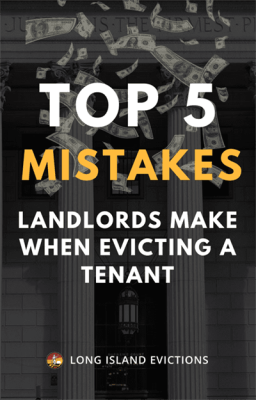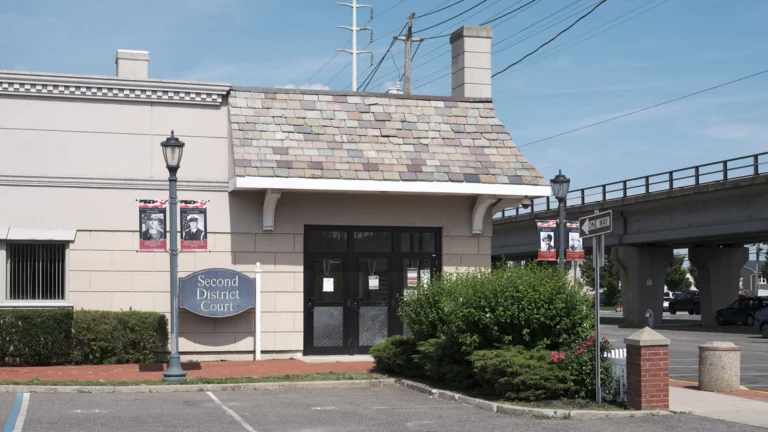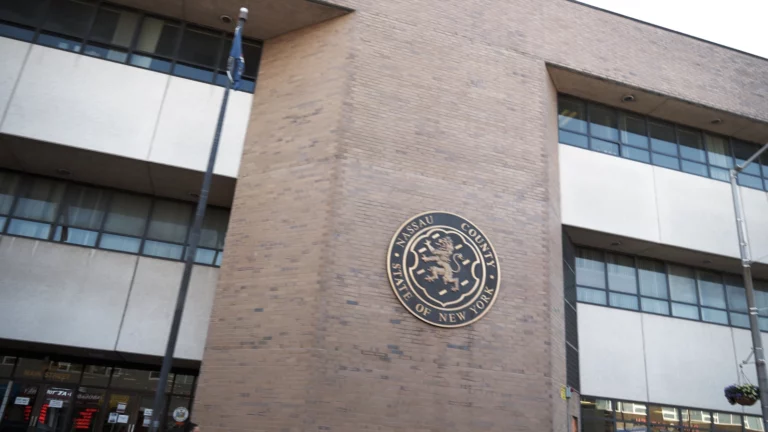Ask a Landlord-Tenant Attorney
Get your questions answered, and read other people’s answers below.
FAQs from Landlords
The timeline for an eviction has many variables. But as a general guide, Suffolk County District Courts usually take 30-45 days to resolve an eviction; the Nassau County District Court usually takes 45-60 days; and the Town Justice Courts on the East End usually take about 30 days. Then add at least two weeks to that total for unforeseen issues.
Timeframes may vary depending on circumstances, and most evictions will be resolved in less time than that, but to know the maximum time will place the landlord in a better position to make plans for the property.
Many law firms will quote a low price, but then charge you extra for every court appearance, or add on a ton of additional fees.
We charge one low flat rate to evict your tenant. You can view our most recent rates, and learn the questions to ask prospective lawyers on our fees page.
The tenant eviction process varies depending on the type of eviction proceeding you're bringing, the court venue, and the length of the tenancy.
Generally you serve a tenant with the prerequisite notices required by law, then you draft, file and serve a petition with notice. You appear in court, and the judge will decide if your request for a judgment of possession and a warrant of eviction will be granted or not.
You can view a more detailed description of the process to evict a Long Island tenant here.
And you can view a timeline of a sample evictions matter here.
Yes. The legality of an apartment has nothing whatsoever to do with the eviction process. Illegal apartments are an issue between the town and the landlord. If a landlord is caught by the town with an illegal apartment, a landlord may pay fines, but that does not affect the landlord-tenant relationship. A tenant is still obligated to pay rent, and a landlord of an illegal apartment can still evict them.
You may enjoy this article on the penalties for renting an illegal apartment on Long Island.
When a tenant is at least 5 days late with rent, you have to notify your tenant by certified mail of their lateness and tell them the total amount of rent due. Then you have to serve the tenant with a 14 day rent demand, which lets the tenant know they have 14 days to pay all the back rent owed, or move out. If your tenant pays the rent in full within the 14 day period, then you can no longer evict them for nonpayment of rent, as the rent has been paid.
If they refuse to pay you in full or move out by the expiration of the 14 days, the landlord can then initiate an eviction proceeding for nonpayment of rent in court.
The tenant's security deposit can only be used as rent if the tenant agrees to that. If the tenant doesn’t agree, then within 14 days after the tenant moves out you have to either return the security deposit in full, or provide the tenant with an itemized list of how the security deposit was used to cover damages, and then return the difference to the tenant if any.
Yes. If there is a written lease that clearly says no pets are allowed, first make sure you comply with any notice requirements that may be in your lease, such as a notice to cure. Once you provide your tenant with any required notices and if they've still refused to comply, then you may bring an eviction proceeding based on the tenant's default of a material provision of the lease.
But just note you will have the burden of proving that the tenant has a dog. And the burden is often higher than most landlords imagine. A photograph of a dog at the property is not sufficient. Especially if the tenants deny they have a dog. The type of evidence that would be sufficient would be:
- The tenant admitting they have a dog
- Video of the tenant walking the dog or playing with the dog at the property
- A dog license from the town registered to the tenant at the property.
Yes you do have to appear in court IF there's a trial or hearing. Because your lawyer cannot also be your witness at a trial. The landlord or property manager with personal knowledge of the facts must be available to testify in order to establish your case.
But until there's a trial or hearing, most appearances can be handled by your landlord tenant lawyer without you needing to be there. Your lawyer will let you know when you need to be there, if at all.
It depends. If the tenant's conduct is disturbing the quiet enjoyment of another tenant who lives at the property, then yes, they may be evicted even through they're paying their rent on time and they have a lease. It also depends on the terms of the lease.
But in most circumstances, when there is a lease in place ands the tenant is paying rent on time, the burden of proof needed to remove them is high. For example, it's very difficult to prove that noise is coming from a particular source, or that it’s the nuisance tenant that is actually the one smoking. Unless your tenant is willing to admit to their behavior, you would need to gather some solid evidence for court.
Sometimes adult children refuse to leave home, and sometimes they unfortunately develop behavioral or substance abuse problems or become violent. If you have made the difficult decision to evict your adult child, it would be possible. But it depends on the circumstances under which he came to live there.
If he's lived there his whole life then you cannot use the eviction courts to evict him. You have to bring an action in ejectment in New York State Supreme Court instead of an eviction proceeding in district court.
But if your son has not living there his entire life, for example if he moved out, but recently moved back in as an adult after living someplace else, then he can most likely be evicted either as a tenant or a licensee depending on the circumstances.
No. ERAP is the New York State Emergency Rental Assistance Program (ERAP). It provides temporary assistance to tenants who cannot pay their rent. Even through the COVID-19 crisis is largely behind us, ERAP was extended in New York until the year 2025.
Currently, if your tenant has applied for ERAP, you cannot start an eviction proceeding against them. And if you already have started an eviction proceeding before the tenant filed a request for ERAP, then the ERAP application puts a stay on your current eviction proceeding until the application has been decided.
No, you cannot evict the tenant for a term of one year after the last period that ERAP paid for, unless it is for non-payment of rent that accrued after the last period covered by ERAP.
No. You do not have to enter into any sort of written agreement with your tenant if you don’t want to. A tenancy can exist on a month to month basis. And it can be every bit as legitimate and legal as one with a lease. A long-term lease often only protects the tenant, because it often removes the landlord's ability to increase the rent, or evict a tenant for anything other than nonpayment of rent.
Yes. Provided that there are no children in common, that the girlfriend shares the house completely (doesn't have her own apartment) and that the girlfriend didn't make any rent or mortgage payments. Usually a girlfriend is considered a licensee. And a licensee can be removed after serving a 10 day notice and then starting the eviction process in court.
A constructive eviction is when a landlord takes action against a tenant in such an extreme manner that it interferes with the tenant's right to live at the property. If a landlord causes a constructive eviction, the landlord may lose his right to bring a legal eviction proceeding.
Examples of this would include changing the locks, interfering with or shutting off utilities, or extreme harassment of the tenant with noise or other things that make it difficult for the tenant to live at the property. if a tenant can prove these things, then the court may find that a constructive eviction has taken place, and the landlord can be denied a judgment of possession and a warrant of eviction because of the behavior that led to the finding of a constructive eviction.
Only the Sheriff can physically remove a tenant in Nassau or Suffolk county. Once you get your warrant of eviction from Court, you bring it to the Sheriff and the Sheriff will come to the apartment and serve the tenant with a 14 day notice. If the tenant doesn’t leave at the end of the 14 days, the Sheriff can return and physically remove the tenant from the premises. In Nassau County, landlords are also required to pay for 30 days of storage for the tenants' belongings if the Sheriff has to physically remove them.
FAQs from Tenants
You do not have to move until the landlord serves you with the proper notice.
- If you have no lease and have been living in the apartment for less than a year, the landlord must give you a 30 day notice.
- If you've been living in the apartment for at least a year, but less than 2 years, your landlord has to give you a 60 day notice.
- And if you’ve been living in the apartment for 2 years or more, your landlord has to give you a 90 day notice.
After the time on the notice expires, the landlord may then start the eviction process in court. And if the landlord is successful in getting a warrant of eviction, the sheriff will come and physically remove you if necessary. But you will not be forced to leave until that entire process is complete.
As long as you have left the property vacant and clean, and have returned the key to the landlord, the landlord must return your security deposit within 14 days. If not, your landlord must let you know in writing why he or she isn't returning your security deposit, and how your security deposit is being applied to repair damages that you have caused.
If the landlord fails to give you back your security deposit unjustly, you can sue the landlord in court, and you will likely win a judgment against your landlord for your security deposit.
For the most part, yes. A landlord may increase your rent in this situation at any time with notice. But if the rent increase is greater than 5%, the landlord must give you notice in writing.
- If you have lived in the apartment for less than 1 year, then the notice must be given to you at least 30 days in advance of when the increase takes effect.
- If you have lived in the apartment for at least 1 year, but not more than 2 years, then the rent increase cannot take effect until 60 days after the notice is given.
- And if you have lived in the apartment for at least 2 years or more, the landlord cannot increase the rent until 90 days after the written notice is given to you of the rent increase.
But no such notice is needed if the increase of rent is less than 5%. If you're not a month to month tenant but rather a tenant with a lease for a term that has not yet expired, then the landlord cannot increase the rent at all until after the term of the lease. And at that point, you would still be subject to the same notice requirements.
Yes. You must continue to pay rent as long as the landlord owns the house. When the landlord loses the foreclosure proceeding in court, you no longer have to pay the landlord rent. But foreclosure proceedings take a very long time, and often end with the landlord simply modifying their mortgage and keeping the house. So just because a landlord gets served with foreclosure papers does not mean you no longer have to pay them rent. The landlord can still evict you for nonpayment of rent even when the house is being foreclosed on.
* Disclaimer: Nothing on this site constitutes legal advice. As information and case law changes quickly, we do not guarantee the accuracy of any information contained on this website. Submitting a question does not form an attorney-client relationship. By submitting a question, you acknowledge that we may post your question publicly. Please read our website terms for additional restrictions.
Call or Text
Have Questions?
Speak with Us For Free.
We offer free consultations via phone or text. Don't wonder about what your rights are or what your next move is. Call or text and find out right now.
- Get the free guide

Is this you?
want our free guide?
Subscribe to our newsletter & make sure you’re not making the same mistakes.



